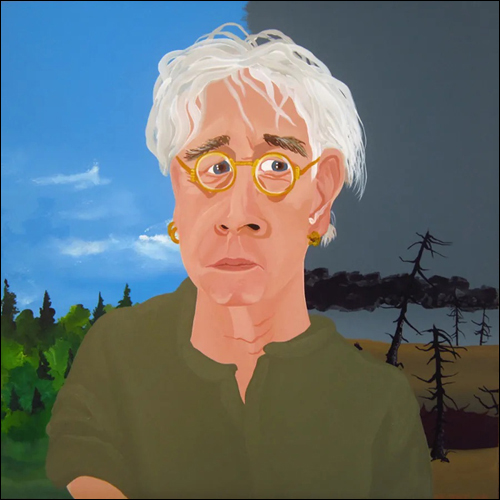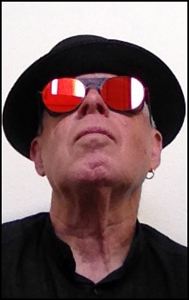By Steven Libowitz | November 21, 2023
Singer-songwriter Bruce Cockburn has released some 35 albums over his half-century career, enjoying enough success stateside to sustain making music, but also falling far short of the household name recognition of fellow Canadians like Joni Mitchell, Leonard Cohen, or even Gordon Lightfoot.
Now at 78, Cockburn – whose catalog includes such transcendent love songs as “This is One of the Best Ones” and polemics like “If I Had a Rocket Launcher” – has released a new album, O Sun O Moon, that shares how time takes its toll and slipping the mortal coil, but also invites us “out of the armor and into the now” and exclaims when “push comes to shove, it’s all about love.” He talked about all of it in a far-reaching conversation from his San Francisco home in advance of a solo show at the Lobero Theatre on November 18.
Q. Let’s just jump right in: How do you think your songwriting has changed and evolved over the years?
A. The perspective I have now is as an old guy, and you can probably trace how that’s changed. But not the point of view. Opinions might be different, but it’s more a deeper understanding because when I was young, I didn’t really understand anything… The songs have always just been a product of the time in my life that they appear – triggered by what I encounter that produces a strong emotional response, and what happens in my heart and mind.
Q. So is songwriting a way of processing, a method of making sense of the world and yourself, sorting that through in search of understanding, or more a way of communicating what’s internal?
A. I really only know after the fact… It’s not like I have something burning to get off my chest. But when I go for a long time without writing a song, I do feel choked up and confined. But it’s only with hindsight that I can see that a given song was processing something.
Q. You’ve been praised for the ability, more than most singer-songwriters, to balance between the outer and inner world, and the gritty details and the spiritual essence. Does that resonate? And if so, how do you navigate between them?
A. I’m aware of the degree to which being able to do that pleases me. It’s how I like to see things. I don’t think any good purpose is served by separating the day-to-day from the spiritual. I think they should mix, and they should influence each other, or at least the spiritual should influence the day-to-day. So it’s never very far from my line of thought, and therefore it shows up a lot in the songs no matter what I’m talking about.
Q. What about the permeability of the inner and outer worlds?
A. They’re not distinct at all. The phrase “my journey” sounds so grandiose, but I feel like it’s a thread that’s run through my life from the beginning of being self-aware that the membranes are permeable. The older I’ve gotten, there’s refinement of where I started. Early songs “Spring’s Song” and “Man of a Thousand Faces” I’m asking, “What is this? Where are we? What are we doing?” … I’ve always expressed my understanding of the need for a relationship with the divine. I feel like it’s clearer now, and the weight of it is more evident now.
Q. People tend to want to separate your catalog into political and personal songs. But you’ve shared that there’s no difference to you.
A. They’re all love songs. Even “If I Had a Rocket Launcher” – it’s a cry of pain, not hatred. I was expressing anger, but the last thing I wanted to do was go kill anybody. I wanted people to feel what it’s like to be in a situation like that, which is the point of art. Whether it’s something physical like a refugee camp under attack, or dealing with your own inner processes, you’re still singing your truth so that people might see things in new ways. Otherwise, why bother?
Q. How have you been able to maintain that equilibrium as our world has become even more polarized? You seem to still seek commonality, practice acceptance, and yearn for understanding. Someone else put it that you have a hope for a better world that you can’t shake.
A. It’s more necessary than ever to allow any worthwhile thoughts and feelings about that out to where they can be heard. It’s not in the dialogue that we see around us, which is so fragmented – everybody’s talking at the mirror. I think it’s really important now to offset that in any way available… When an idea for a song like “Us All” comes along I jump on it, because it means something bigger than some of the other ones, which all have their own significance and meaning and importance to me personally. I really want to get that out there and heard… Don’t get me wrong. I don’t have enough self-confidence to think of myself as influencing people, which is an utterly foolish goal anyway. Or maybe it’s a dodge, I don’t want to accept the responsibility. But what I see myself doing is sharing what I have experienced, felt, questioned, and understood with whoever’s willing to listen.
Q. Your new album has the thread of contemplating mortality, but you’ve been doing that for decades, going back at least to “Wondering Where the Lions Are,” which repeats the phrase “I’m thinking about eternity.”
A. It’s just part of the landscape… but you can’t help noticing that the horizon is getting closer all the time … My fear and my hope – the fear leads – is that when I get to that threshold and step over it, or I’m dragged over it, that I recognize the divine when it shows up. What that means in practical terms, I have no idea.
Credit: montecitojournal.net









